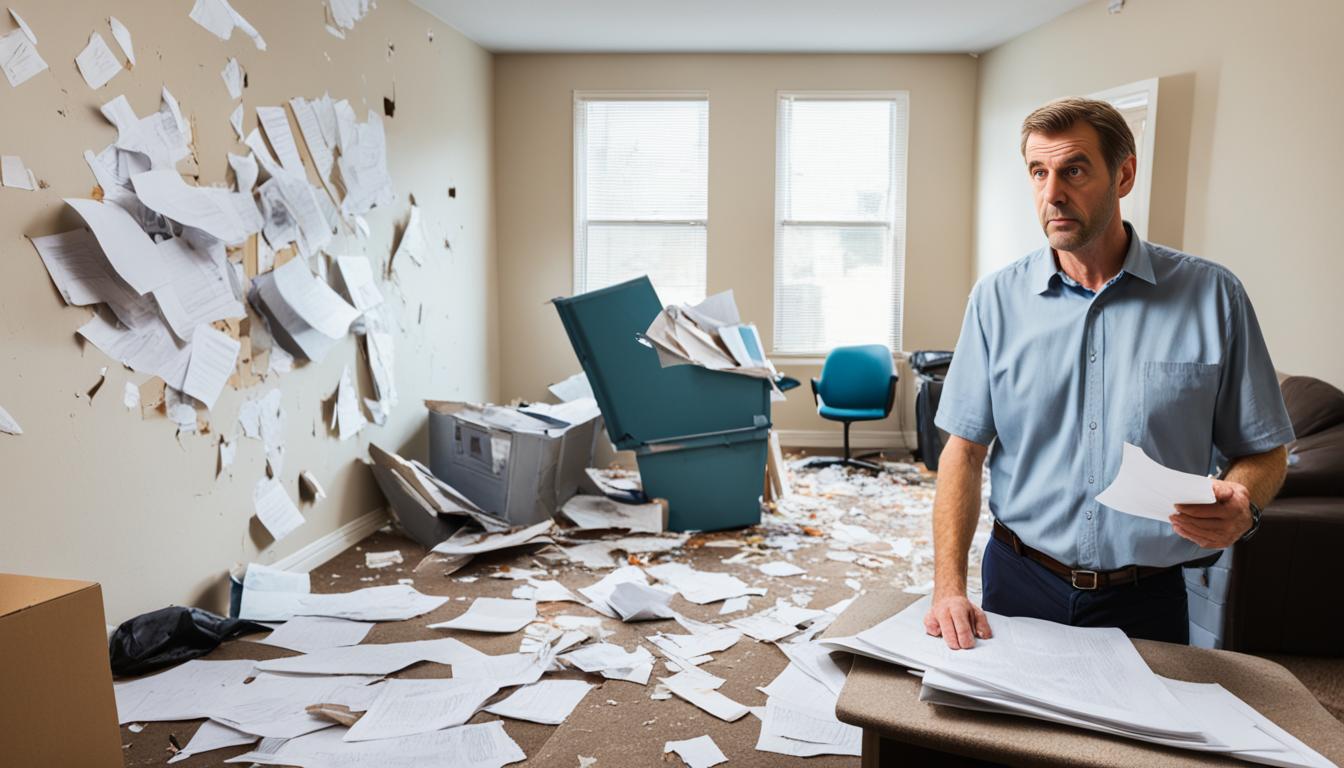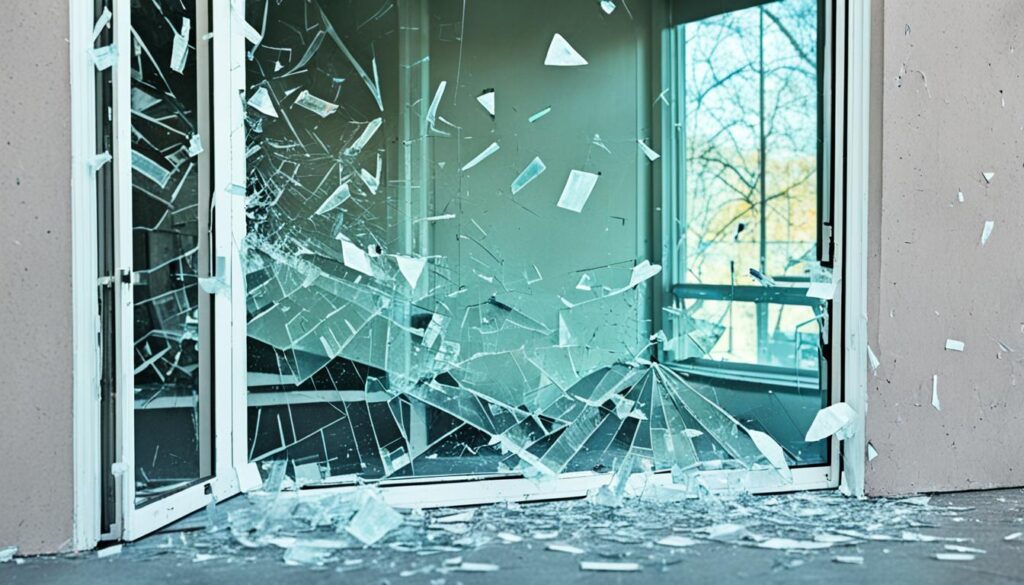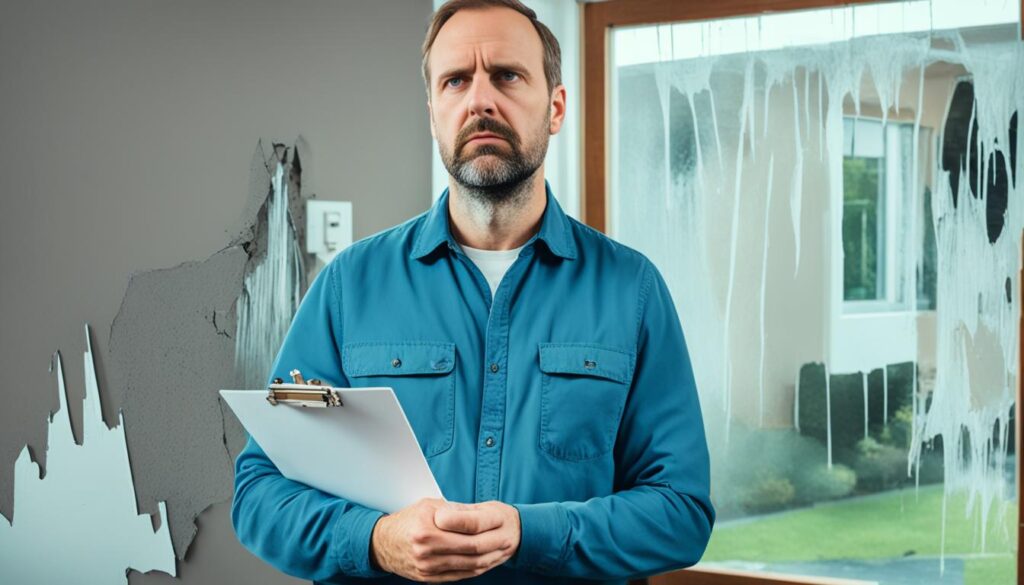
Landlord Rights: Sue Former Tenants for Damages Caused
Can a landlord sue the former tenants for damages caused to their property? This question often arises in the context of landlord-tenant disputes, where property damage becomes a significant concern. In this section, we will explore the legal rights of landlords and the potential for pursuing legal action against former tenants for damages caused.
Landlords have certain legal rights when it comes to their property, and holding tenants accountable for property damage is one of them. Understanding these rights and the responsibilities of tenants is crucial for navigating such situations and seeking appropriate compensation.
In cases of property damage caused by former tenants, landlords can pursue legal avenues to recover the costs incurred. Proving that the damage was caused by the tenant and demonstrating the extent of the damages are key elements in a successful lawsuit.
Key Takeaways:
- Landlords have the right to sue former tenants for damages caused to their property.
- Understanding the legal rights and responsibilities of landlords and tenants is crucial in pursuing legal action.
- Gathering sufficient evidence and documenting damages are vital in building a strong case against former tenants.
- Consulting legal professionals who specialize in landlord rights and tenant disputes can provide valuable guidance throughout the process.
- Taking appropriate legal action is essential for protecting landlords’ investments and ensuring accountability from tenants.
Understanding Landlord-Tenant Disputes
Before we delve into the topic of suing former tenants for property damages, it’s important to understand the common disputes that may arise between landlords and tenants. By understanding the legal rights of landlords and the responsibilities of tenants, you can better navigate these situations.
In any landlord-tenant relationship, disputes can arise due to various reasons such as non-payment of rent, breach of lease terms, property damage, noise complaints, or maintenance issues. These disputes can often lead to tension and disagreements between the parties involved.
Landlords have legal rights that protect their property and ensure that tenants fulfill their obligations. Understanding these rights is crucial for landlords to effectively address any disputes that may arise.
Some common landlord rights include:
- The right to collect rent on time and in full
- The right to enforce lease terms and regulations
- The right to inspect the property and make necessary repairs
- The right to terminate a lease agreement in case of violations
On the other hand, tenants also have legal rights that protect them from unfair treatment and ensure their living conditions are safe and habitable. These rights may vary depending on state and local laws, and it’s essential for both landlords and tenants to familiarize themselves with the specific regulations in their area.
Some common tenant rights include:
- The right to occupy a safe and habitable property
- The right to privacy and freedom from landlord harassment
- The right to request repairs and maintenance
- The right to receive proper notice before eviction
When a dispute arises, it’s important for both parties to communicate openly and attempt to resolve the issue amicably. In many cases, disputes can be resolved through negotiation, mediation, or arbitration without the need for legal action.
However, in certain situations where the dispute cannot be resolved through alternative methods, landlords may choose to pursue legal action against their tenants to seek compensation for damages caused to the property.
Understanding the legal aspects of landlord-tenant disputes is crucial for both landlords and tenants to avoid unnecessary conflicts and protect their rights. By familiarizing themselves with the relevant laws and regulations, both parties can ensure a fair and harmonious relationship.
Tenant Property Damage Liability
In the landlord-tenant relationship, it is vital to define the responsibilities and liabilities of each party. When it comes to property damage, tenants have a certain level of liability that they must adhere to during their tenancy. Understanding these responsibilities is crucial to ensuring a harmonious living environment and avoiding disputes between landlords and tenants.
Tenants have a duty to maintain the property in good condition and prevent any damages that may occur due to negligence or improper use. This includes keeping the property clean, reporting any maintenance issues promptly, and using the property in a reasonable manner.
“Tenants have a duty to maintain the property in good condition and prevent any damages.”
If damages do occur during a tenant’s occupancy, they may be held liable for the cost of repairs, depending on the specific terms outlined in the lease agreement. It is essential for both landlords and tenants to clearly define the tenant’s liability for property damage in the lease agreement, ensuring that any potential disputes are resolved smoothly and efficiently.
In the event of property damage, landlords and tenants should work together to address the issue and reach a fair resolution. Open communication is key to resolving disputes amicably and avoiding unnecessary legal action. However, if an agreement cannot be reached, legal recourse may be necessary.
To better understand tenant property damage liability, let’s take a look at the following table:
| Types of Property Damage | Tenant’s Responsibility |
|---|---|
| Accidental damage to the property caused by the tenant | Tenant is responsible for repairs and associated costs |
| Damage resulting from tenant negligence or misuse | Tenant is responsible for repairs and associated costs |
| Natural wear and tear | Tenant is not responsible for repairs |
| Damage caused by a third party invited by the tenant | Tenant may be responsible for repairs, depending on the circumstances |
It is important for both landlords and tenants to be aware of these responsibilities and liabilities to maintain a healthy and mutually beneficial landlord-tenant relationship. By clearly defining tenant property damage liability in the lease agreement and addressing any issues promptly and professionally, both parties can protect their interests and maintain the integrity of the rental property.

Legal Options for Landlords
When it comes to seeking compensation for damages caused by former tenants, landlords have several legal options available to them. Understanding these options is essential to navigate through landlord tenant disputes and protect your rights as a property owner.
Filing a Lawsuit
One of the main legal avenues for landlords to pursue is filing a lawsuit against the former tenant. By taking this course of action, you can seek financial compensation for the damages caused to your property. However, it’s important to note that filing a lawsuit should be considered as a last resort, as it can be a time-consuming and costly process.
Burden of Proof
When filing a lawsuit against a former tenant, the burden of proof lies with the landlord. This means that you will need to provide evidence to support your claims of property damages. Gathering and documenting evidence such as photographs, receipts for repairs, and witness statements will strengthen your case and increase the chances of a favorable outcome.
Potential Outcomes
Before pursuing a lawsuit, it’s crucial to understand the potential outcomes. If successful, landlords may be awarded compensation for the damages caused, including repair costs, lost rental income, and legal fees. However, the outcome of the lawsuit can vary depending on the specific circumstances of the case and the judge’s ruling.
“By understanding the legal options available, landlords can take appropriate action to protect their rights and pursue compensation for property damages caused by former tenants.” – Legal Expert
| Potential Outcomes: | Description: |
|---|---|
| Compensation | If successful, landlords may be awarded financial compensation to cover repair costs, lost rental income, and legal fees. |
| Partial Compensation | In some cases, landlords may be granted partial compensation depending on the extent of the damages and the evidence provided. |
| Dismissal | If the landlord fails to provide sufficient evidence or prove negligence on the part of the former tenant, the lawsuit may be dismissed. |
| Counterclaim | In certain situations, the former tenant may file a counterclaim against the landlord, disputing the damages or seeking compensation for their own losses. |
Assessing Damages and Gathering Evidence
When it comes to pursuing a lawsuit against a former tenant for property damages, landlords need to gather sufficient evidence to support their claims. Assessing the damages and documenting them thoroughly is a crucial step in building a strong case. Here’s a step-by-step guide to help you navigate this process effectively:
- Inspect the Property: Begin by conducting a comprehensive inspection of the rental property to identify all damages caused by the tenant. Take note of any structural, cosmetic, or functional issues that need repair or replacement. This will serve as the basis for estimating the extent of the damages.
- Photographic Evidence: Capture clear and detailed photographs of all the damages, both close-up and from a wider perspective. Ensure that the images are well-lit and accurately portray the condition of the property. These photos will provide visual evidence of the tenant’s responsibility for the damages.
- Written Documentation: Create a detailed written report that describes each damage, including its location, size, and the estimated cost of repair or replacement. Include any relevant supporting documentation, such as receipts or invoices for repairs carried out after the tenant’s departure.
- Witness Statements: If there were any witnesses to the damages caused by the tenant, obtain written statements from them. These statements can help corroborate your claims and strengthen your case.
- Expert Opinions: In complex cases or instances where the extent of the damages is disputed, you may need to hire an expert, such as a professional appraiser or contractor, to provide an opinion on the cost of repairs. Their expert testimony can add credibility to your claim.
Remember, the key to success in a landlord lawsuit against a tenant lies in gathering accurate and substantial evidence. By following the steps outlined above, you can build a strong case and increase your chances of obtaining compensation for the damages caused to your rental property.
For visual reference, the following table summarizes the steps involved in assessing damages and gathering evidence:
| Steps | Description |
|---|---|
| Inspect the Property | Thoroughly inspect the rental property to identify damages. |
| Photographic Evidence | Take clear and detailed photographs of all damages. |
| Written Documentation | Create a comprehensive written report describing each damage. |
| Witness Statements | Obtain written statements from witnesses, if available. |
| Expert Opinions | Seek expert opinions for complex or disputed cases. |
By diligently following these steps and compiling a strong body of evidence, you can significantly strengthen your position in a landlord lawsuit against a tenant for property damages.

Working with Legal Professionals
Sometimes, navigating the legal process can be complex, especially when it comes to the legal rights of landlords and pursuing a lawsuit against a tenant. In such situations, it may be beneficial for landlords to seek the assistance of legal professionals who specialize in landlord rights and tenant disputes. Working with an experienced attorney can provide numerous advantages and help you navigate the complexities of the legal system.
Here are some key benefits of working with legal professionals:
- Expertise: Attorneys who specialize in landlord-tenant law have comprehensive knowledge and expertise in this specific area. They understand the nuances of landlord rights, tenant responsibilities, and the legal processes involved in filing a lawsuit against a tenant.
- Legal Guidance: Legal professionals can provide you with accurate and up-to-date information about your legal rights as a landlord. They can guide you through the legal process, ensuring that you understand the steps involved in pursuing a lawsuit against a tenant and the potential outcomes.
- Case Evaluation: Attorneys can assess the strength of your case and help you determine the likelihood of success in pursuing legal action against your former tenant. They can analyze the evidence, identify any potential legal defenses, and advise you on the best course of action.
- Documentation and Preparation: Legal professionals can assist you in preparing all necessary documentation and evidence required to support your case. They can help you gather relevant information, organize it effectively, and present it in a compelling manner.
- Representation in Court: Should your case proceed to court, an attorney will provide the essential representation you need. They will advocate for your interests, present your case before the judge or jury, and handle all legal proceedings on your behalf.
Working with legal professionals who specialize in landlord rights and tenant disputes can significantly increase your chances of success when pursuing a lawsuit against a tenant for damages caused to your property. Their expertise, guidance, and representation can alleviate the stress and complexities involved in the legal process, ensuring that your rights as a landlord are protected.
If you are considering taking legal action against a former tenant or have any questions about your legal rights, it is highly recommended to consult with a qualified attorney who specializes in landlord-tenant law. They can provide personalized advice based on the specific details of your situation, increasing your chances of a successful outcome.
Conclusion
In conclusion, landlords have the legal right to sue former tenants for damages caused to their property. Understanding the legal rights and responsibilities of both parties is crucial for landlords to protect their investment. It is recommended to consult legal professionals who specialize in landlord rights and tenant disputes to receive expert guidance in pursuing a lawsuit against former tenants.
If you suspect mold damage to your rental property, it is important to address the issue promptly. Contact Fix Mold Miami at 305-465-6653 for a mold assessment and necessary remediation services. Protecting the condition and value of your property should be a top priority as a landlord.
Remember, being proactive and informed can help landlords navigate through the challenges that may arise when dealing with former tenants. By taking appropriate action and seeking the necessary legal support, landlords can recover damages and ensure that their investment is protected in the long run.




